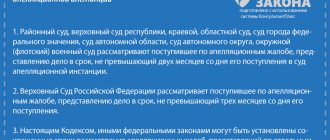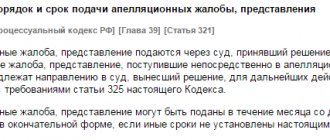Nizhny Novgorod Regional Court Plaintiff: N.T.M. Moscow, st. Korneichuka, 48 Representative of the Plaintiff: Kuryanov A.A. Legal bureau "Moscow legal" Moscow, st. Maroseyka, 2/15 tel Defendant: LLC "F." Nizhny Novgorod, Studencheskaya Street Third party: GIT in the Nizhny Novgorod region, Nizhny Novgorod, st. Piskunova, 3 Third party: Prosecutor's Office of the Sovetsky District of Nizhny Novgorod Nizhny Novgorod Region, Nizhny Novgorod, Golovnina Street, 36-A Case No. 9-50/20__ ~ M-133/20__.
PRIVATE COMPLAINT against the court's ruling to return the statement of claim
"13" January 20__ The Sovetsky District Court of Nizhny Novgorod received a statement of claim from N.T.M. to LLC "F." on declaring the dismissal illegal, reinstatement at work, and recovery of compensation for the period of forced absence.
"13" January 20__ Judge of the Sovetsky District Court of Nizhny Novgorod L.A.A. a ruling was made to return N.T.M.’s statement of claim. to LLC "F." This determination was received by plaintiff N.T.M. by mail on March 07, 20__. In its ruling, the court referred to clause 4 of part 1 of Art. 135 of the Code of Civil Procedure of the Russian Federation, according to which the judge returns the statement of claim if the statement is not signed by the plaintiff, or is signed and filed by a person who does not have the authority to sign it and present it to the court. So, according to the court, the blueprint of the power of attorney dated June 29, 2020, available in the case materials. addressed to Kuryanov A.A. and Khoruzhenko A.S. does not meet the specified requirements.
Apparently the court made a technical error, since the statement of claim was sent in 4 copies: a copy of the Sovetsky District Court of Nizhny Novgorod Court, a copy for the defendant F. LLC, a copy of the claim for the State Labor Inspectorate in the Nizhny Novgorod Region and a copy of the claim for Prosecutor's office. Each of the statements of claim was signed by a representative by proxy A.A. Kuryanov, however, the court copy, in addition to the signature of A.A. Kuryanov, also had the signature of the Plaintiff N.T.M.
In addition, it should be taken into account that, according to established practice, claims are filed, as a rule, with copies of documents and, in particular, copies of the power of attorney attached. And in some cases, if the court has doubts about the authenticity of a particular power of attorney, the court, according to existing practice, leaves the statement of claim without movement, guided by Art. 136 Code of Civil Procedure of the Russian Federation. At the same time, the return of the statement of claim according to the rules of Art. 135 of the Code of Civil Procedure of the Russian Federation in this particular case, in a claim for recognition of dismissal as illegal, reinstatement at work, collection of compensation for forced absence, makes it impossible to protect the rights and legitimate interests of the plaintiff, since, according to the provisions of Article 392 of the Labor Code of the Russian Federation, the statute of limitations for labor disputes, i.e. The deadline for filing a claim for illegal dismissal is one calendar month from the day the dismissal order or work record book was issued.
Based on clause 7, part 1, art. 333.36 of the Tax Code of the Russian Federation, the plaintiff is exempt from paying state fees when filing a private complaint against a court ruling.
Based on the above, guided by Articles 131, 132, 135, 136, 331 of the Code of Civil Procedure of the Russian Federation, 333.36 of the Tax Code of the Russian Federation,
Filing and consideration of a private complaint
An appeal against a court ruling is filed with the court of first instance. There is no state fee for filing an application.
The procedure for considering private complaints is established in Article 333 of the Code of Civil Procedure of the Russian Federation. The main feature of their consideration is that, as a general rule, the court considers them without notifying or summoning the participants in the civil process. That is, you will not be able to give oral explanations and present any of your arguments to the court. Therefore, a private complaint should be as detailed as possible.
The following definitions, as an exception to the general rule, are considered with notification and summons to the participants in the case:
- suspension of the proceedings,
- termination of proceedings,
- leaving the application without consideration,
- satisfaction or refusal to satisfy an application, proposal for review of court decisions based on newly discovered or new circumstances,
- on forced execution or refusal to enforce a decision of a foreign court, and a number of others (Part 2 of Article 333 of the Code of Civil Procedure of the Russian Federation).
If the court deems it necessary, it may schedule a hearing on a private complaint on other issues.
What is the deadline for filing a complaint?
The period is 15 days. The time for filing begins to count from the moment the court makes its decision. The day of adoption of the act itself is not included in the deadline. Days are considered calendar days, not working days, and therefore all holidays and weekends are also included in the appeal period.
For example, if the determination was made on March 5, then the period for appeal will begin on March 6. The last day of the deadline is March 20.
The period for appealing a court decision, in turn, from the date of its adoption is one month.
If the deadline is missed, you should file a petition for its restoration. The petition can be included in the text of a private complaint or submitted as a separate document, the main thing is to do this simultaneously with filing the complaint.
Instructions for finding information about a court decision
The easiest way to find a court decision by the name of the defendant or plaintiff is on the Internet. There are many resources for this. But most often interested users look at official court resources. The search procedure in this case will look like this:
- log in to the official website of the court;
- go to the “Courtwork” block (most resources have it);
- the monitor will display a table or list of cases considered by the court with the date of the hearings;
- further you can find the court decision by the name of one of the persons participating in the process.
Thus, information about court proceedings can be viewed on the Internet if the name of both the defendant and the plaintiff is known. If a legal entity is a party to the case, then you will need to know the name of the company and its basic details. This is because the name may not be unique and additional information will be required.
The required information is indicated opposite the name of the participant in the proceedings. If the court has already made a decision, you can familiarize yourself with it. To speed up your search, it is recommended to indicate the date of the meeting and the case number. The more search criteria are specified, the greater the chances of finding the desired case in the site database.
To search for a court decision, you can use any search engine. To do this, enter the last name and case number in the search bar. If the court has posted the information in the public domain, then the document with the required data will be presented on the first page of the search results.
Consideration and result
The court has the right to consider a private complaint without involving the parties to the proceedings. In this case, after receiving the relevant decision of the court of first instance and disagreeing with this decision, it is necessary to file an objection.
If, when drawing up an objection to a private complaint, all the norms of the current legislation of the Russian Federation are observed, and this objection contains significant evidence, then the court will satisfy this objection.
Thanks to objections to private complaints, the appellate court has the opportunity to become familiar with the positions of the parties to the trial and take these positions into account. Since in most cases private complaints are considered by the court without involving all parties to the process, filing an objection is the only method for defending one’s interests.
Where to file a complaint after the first cassation
So, according to the new reforms in the Code of Civil Procedure of the Russian Federation, the cassation appeal procedure in our country takes place in two stages. The first stage is the filing and consideration of a complaint in a cassation court of general jurisdiction of a regional subject of the Russian Federation. After the first cassation, the second stage follows - an appeal to the Supreme Court, the same for all subjects of the Russian Federation. We note that the complaint is being filed with the Judicial Collegium for Civil Cases of the Supreme Court. The application procedure at this stage is much simpler, since you submit all documents directly to the court, in a convenient way (electronically, in person or by mail).
Please note that in accordance with the norms of the Code of Civil Procedure, the Supreme Court, in the cassation procedure, checks the legality of previously adopted court decisions, in contrast to the appeal, where you can also refer to the unfoundedness of the judges' decisions.
Legal assistance in appealing to the Supreme Court
Consultation in the office and by phone
+7(495) 728-99-14
Help from a lawyer. 18 years of experience in appealing to the Supreme Court!
We are working during the quarantine period of 2021! Call.
Deadline and procedure for document submission
To file a private complaint, 15 days are allotted, the countdown of which begins from the day the court makes the appealed decision.
After the court of first instance receives a private complaint, all participants in the trial are notified of its receipt. The notice shall specify the period within which objections may be filed to this particular complaint.
The current legislation of the Russian Federation does not establish rules establishing the period within which objections must be filed to a private complaint. However, this period must be reasonable.
How to find out a court decision in the Russian Federation by last name
Due to certain circumstances, some participants in the proceedings cannot attend the hearings. This practice is especially common when considering cases of divorce. The failure of one of the parties to appear is not a reason for refusing to consider the claim . The court may reschedule the hearing. But if the defendant or plaintiff does not appear at subsequent hearings, then the verdict will be passed without the presence of the interested person. There are known cases when a verdict was passed without a plaintiff or defendant.
The period for consideration of cases currently does not exceed 2 months. In exceptional situations, the court extends court proceedings for another 30 days. After this period, a decision will be made on the case. It does not matter whether the parties were present at the proceedings or not.
There are several ways in which the defendant (plaintiff) or other interested citizens find out the necessary information:
- Personal presence at court proceedings. After their completion, the judge will make a decision on the case and familiarize everyone present in the courtroom with it. But in certain cases, participants in the process cannot appear in court. In this case, the court decision on paper is sent by mail to the absent party. But this option for obtaining information is relevant only for participants in the process.
- A citizen who is not involved in the case may apply to the court office for a copy of the court decision. This will require not only the name of the participants, but also the location of the court. Interested parties will also receive information orally by calling the court office by phone.
- The fastest and easiest way to obtain information is to search for it on the official website of the court on the Internet. According to Federal Law of the Russian Federation No. 262, information about court proceedings and decisions on them must be publicly available to citizens of the Russian Federation. The name of one of the participants will give the interested user access to familiarize himself with the decision made by the court almost immediately after its announcement. But there is a possibility of finding a verdict passed against the full namesake of the participant in the proceedings.
Information about the verdicts rendered by the court is in most cases publicly available. To view the decision, you will need the name of at least one participant and the address of the court.
Who can file an objection and where?
An objection to a private complaint in a civil case has the right to be filed by the party to the proceeding whose interests are affected by this private complaint.
The objection must be sent to the court of first instance, which conducts the judicial proceedings.
The procedure for filing a private complaint is determined by the following regulations:
- Civil Procedure Code of the Russian Federation;
- Code of Administrative Procedure of the Russian Federation.
All objections filed by participants in the trial will be considered by the appellate authority at the regional or other level. If a representative submits an objection on behalf of a participant in the process, a power of attorney to perform this action will be required.
READ ALSO: How to file a complaint against a judge in the RF IC?







